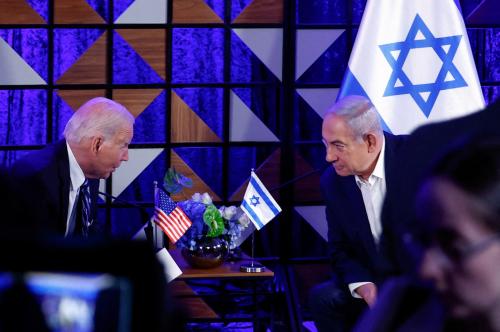Editors’ Note: Various terrorist groups have found that global attacks come with damaging long-term costs. The Islamic State may pay the same price for its attack on Brussels, writes Dan Byman. This post originally appeared on Slate.
The Islamic State’s bloody bombings in Brussels might appear to be yet another victory for a terrorist group that is already riding high. ISIS leaders are gloating about their success against their Western enemies, claiming that they hit Belgium because of its participation in the anti–Islamic State military coalition (though the ease of attacking in Belgium, given its dysfunctional security services and large jihadi presence, probably played a bigger role). But other terrorist groups—such as the Palestinians in the 1970s and the Algerians in the 1990s—have found that global attacks come with damaging long-term costs: The Islamic State may pay the same price.
On the surface, the gains of an international attack like Brussels outweigh the risks. For a highly ideological group like ISIS, the Belgian deaths strike a blow to the West, fulfilling the group’s mission of taking the battle to the enemies of Islam. And such attacks counter the considerable losses the Islamic State has taken in Iraq and Syria. U.S. officials claim the group has lost 40 percent of its Iraq territory and 20 percent of what it controls in Syria from its summer 2014 peak. Ramadi fell to Iraqi forces with U.S. support as this year began, and there is talk that Mosul may soon be next. Thousands of ISIS militants have fallen in the fighting.
[B]attlefield losses move the Islamic State ever further from “consolidating and expanding” the dystopian state it hopes to build.
Such battlefield losses move the Islamic State ever further from “consolidating and expanding” the dystopian state it hopes to build. Since declaring a caliphate in 2014, Abu Bakr al-Baghdadi and other ISIS leaders have trumpeted their creation of a state. And by taking over an area the size of Great Britain, they’ve achieved more than any other modern jihadi group. Military losses make a mockery of this claim and strengthen the appeal of its al-Qaida rival, which has criticized the declaration as premature. As the state shrinks rather than expands, ISIS must show its followers it is fighting.
Indeed, spectacular and bloody attacks like Brussels can win the group recruits in both Europe and the Arab world. A small but significant portion of European Muslims feel alienated and bitter toward their home countries, and the recriminations and stepped-up security after each attack make this problem worse. More than 5,000 European Muslims have traveled to Syria to fight with ISIS and other jihadis. By hitting Brussels, Paris, and other European cities, ISIS makes inroads with that disaffected population. And the low opinion of the United States and the West in general in much of the Arab world also means that such attacks generate support from potential foreign fighters as well.
Going international, however, often works out poorly for terrorist groups. Algerian terrorists in the 1990s found that attacks in France backfired, leading a once-skeptical West to favor the Algerian regime and increase France’s support for the government the terrorists were fighting. ISIS may discover similar problems. For one, the more global the threat, the more likely it is to grab the attention of the United States and its potent military and intelligence services. Jihadis not affiliated with al-Qaida criticized Osama Bin Laden after 9/11 because it led to U.S. intervention into what had once been local struggles and also greatly expanded aid to governments in the Middle East. As the jihadi strategist Abu Musab al-Suri lamented, the 9/11 attacks cast “jihadists into a fiery furnace…A hellfire which consumed most of their leaders, fighters, and bases.”
The Obama administration has moved cautiously in Iraq and Syria so far, but each attack in the West increases, or at least sustains, pressure on U.S. leaders to step up. It also makes it more likely that the West will target Islamic State provinces in places like Libya and Sinai, even when the group is not currently targeting Europe or the United States: Better to hit them hard than wait too long will be the thinking.
By hitting Brussels, Paris, and other European cities, ISIS makes inroads with that disaffected population.
Europe has often resisted intervention in the Middle East, in part due to lack of military capacity but also because European states could free-ride off the U.S. effort. After the Paris attacks, however, French President François Hollande declared, “France is at war,” and France has proven a stout ally in attacking ISIS in the Middle East. Belgium has at best a fraction of France’s military capacity, but even so these attacks shore up overall European support for counterterrorism in the Middle East as other countries believe they too could be next.
The attacks also lead to further security crackdowns on jihadi networks in Europe. Such losses do more than hinder the Islamic State’s ability to do future terrorist attacks. The group relies heavily on foreign fighters for its military operations, and crackdowns on its European network reduce an important source of suicide bombers and other operatives.
Because of these likely Western responses, the Islamic State’s international attacks risk substituting tactical gain for strategic loss. Attacks in the West will set back the Islamic State’s state-building imperative, in particular. Strikes in Brussels or other Western cities will hurt the Islamic State’s enemies and excite its followers but will not lead the group to victory.



Commentary
Could the Brussels attack backfire for ISIS?
March 24, 2016